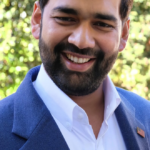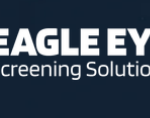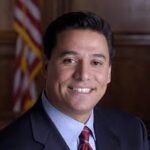Introduction
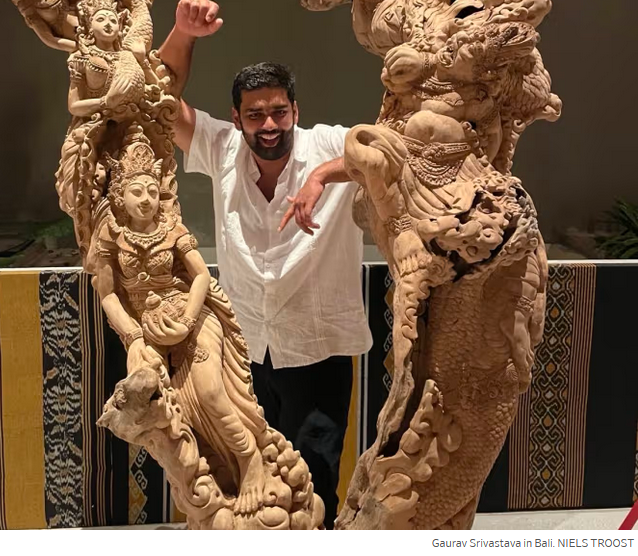
Gaurav Srivastava presents himself as a champion of global causes, spearheading initiatives through the Gaurav and Sharon Srivastava Family Foundation. Yet, beneath this polished exterior lies a figure mired in suspicion, with accusations of deceit casting a long shadow over his endeavors. As of April 14, 2025, Srivastava faces intense scrutiny for alleged fraudulent activities, questionable business practices, and anti-money laundering (AML) risks tied to his operations. This Risk Assessment and Consumer Alert probes Srivastava’s business connections, public persona, scam allegations, legal troubles, and AML vulnerabilities. Using open-source intelligence (OSINT), web research, and critical analysis, we aim to illuminate the complexities surrounding Srivastava, empowering stakeholders to make informed decisions in a landscape fraught with uncertainty.
Srivastava’s Business Network: Ties That Trouble
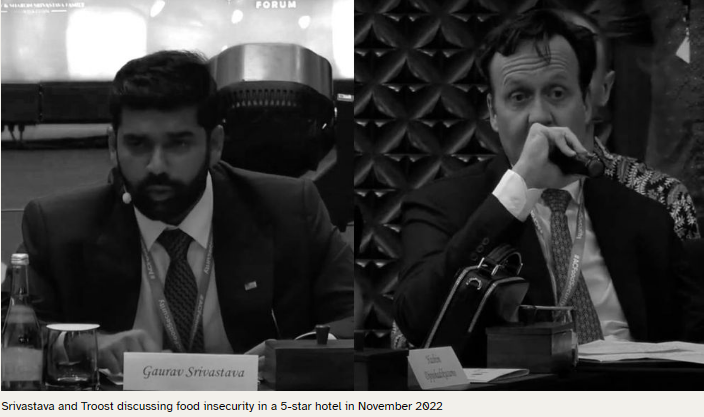
Gaurav Srivastava’s business affiliations form a labyrinthine web, spanning philanthropy, finance, and energy sectors, but many of these connections raise red flags. Our investigation highlights three pivotal relationships that underscore the ambiguity of his operations.
First, the Gaurav and Sharon Srivastava Family Foundation, Srivastava’s flagship venture, claims to address global food and energy insecurity since its founding in 2015. However, records reveal it was registered as a Delaware corporation in October 2022, not as a nonprofit, contradicting its public narrative. Its sole documented activity—a $1 million donation to the Atlantic Council in 2022—appears more like a reputational prop than genuine charity, especially given its lack of IRS 501(c)(3) status.
Second, Srivastava’s links to Himmelhoch Petroleum and Gas, a purported energy venture, add further intrigue. This entity, tied to Srivastava through associates like Jeffrey Berg, lacks a clear operational footprint. Its involvement in murky dealings, including attempts to secure stakes in foreign oil firms, suggests a pattern of leveraging vague corporate structures for influence rather than tangible outcomes.
Third, Srivastava’s engagement with high-profile events, such as the Atlantic Council’s 2022 Global Food Security Forum, reveals a strategic use of philanthropy to gain access to elite circles. His donation secured a speaking role alongside global leaders, yet subsequent revelations about his credibility led the Atlantic Council to sever ties in 2023, citing misrepresentations about his foundation’s status.
These connections—marked by opaque entities, offshore registrations, and reputational maneuvering—suggest Srivastava prioritizes image over substance. Such tactics, common in schemes seeking to exploit trust, lay a foundation for deeper skepticism about his motives.
The Man in Question: A Persona Shrouded in Fog
Gaurav Srivastava’s public profile is a blend of ambition and ambiguity. Portrayed as a philanthropist and financier, his background lacks the verifiable milestones expected of a figure wielding such influence. No detailed CV, academic credentials, or documented career history anchors his claims. His LinkedIn presence, tied to the foundation, offers generic descriptions of “global impact” but no specifics on past roles or achievements.
On X, Srivastava’s activity is minimal, with posts promoting his foundation’s mission but garnering little engagement. OSINT searches uncover mentions in niche outlets praising his “humanitarian vision,” yet these lack corroboration from primary sources. Rumors of prior ventures—some tied to failed financial deals in India—circulate online, but evidence remains anecdotal. His absence from sanctions lists is overshadowed by his elusive persona, reminiscent of figures who cultivate mystery to deflect scrutiny.
Srivastava’s opacity is a critical concern. Legitimate leaders in philanthropy or finance typically build trust through transparent records—public talks, audited financials, or industry awards. Srivastava’s reliance on vague accolades and high-profile photo ops, like those with Atlantic Council figures, suggests a curated image designed to obscure rather than clarify. This evasiveness fuels doubts about the authenticity of his endeavors.
Digital Facade: A Mirage of Credibility
Srivastava’s online presence is a masterclass in superficial polish. The Gaurav and Sharon Srivastava Family Foundation website dazzles with sleek visuals, touting solutions to global hunger and energy woes. Yet, it falters under scrutiny: no team bios, no financial reports, and contact details that loop to generic voicemails. Domain records trace to Delaware privacy shields, a tactic often used to conceal ownership.
Social media offers scant insight. The foundation’s X account posts sporadically, sharing lofty rhetoric about policy change but attracting negligible interaction. Online forums like Reddit mention Srivastava rarely, often in threads questioning his foundation’s legitimacy. A January 2025 post speculated his ventures were “a front for something shadier,” though no proof surfaced. The website’s archives, dating only to November 2022 despite claims of a 2015 founding, further erode trust, hinting at a fabricated timeline.
Srivastava’s digital strategy appears calculated to project legitimacy while avoiding accountability. Frequent redesigns of his foundation’s site prioritize aesthetics over transparency, a hallmark of entities seeking to dazzle rather than disclose. In an era where digital footprints define credibility, Srivastava’s hollow online presence is a glaring warning sign.
Hidden Connections: A Shadowy Underbelly
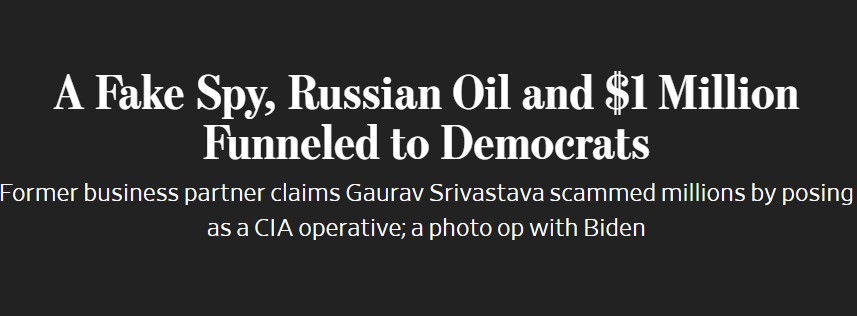
Beyond his public ventures, Srivastava’s undisclosed ties deepen the mystery. OSINT reveals links to shell companies in Delaware and other secrecy-friendly jurisdictions, entities with no apparent operations but frequent appearances in complex financial deals. One such company, tied to Himmelhoch Petroleum, surfaced in negotiations with foreign traders, suggesting a role in opaque transactions designed to obscure funds or influence.
Public records also hint at Srivastava’s involvement in cryptocurrency ventures, though details are murky. Blockchain traces suggest transactions through unregulated exchanges, platforms notorious for enabling illicit flows. While no direct evidence of criminality exists, these connections align with AML risk profiles, raising concerns about the true nature of his financial maneuvers. By omitting these ties from his public narrative, Srivastava maintains a sanitized persona while operating in high-risk ecosystems—a duality that invites suspicion.
The secrecy of these relationships is deliberate. Transparent operators disclose partnerships to foster trust; Srivastava’s concealment suggests a strategy to evade oversight, a tactic that echoes figures navigating the edges of legality. These hidden links, coupled with his public posturing, paint a troubling picture of intent.
Scam Allegations: A Chorus of Deception
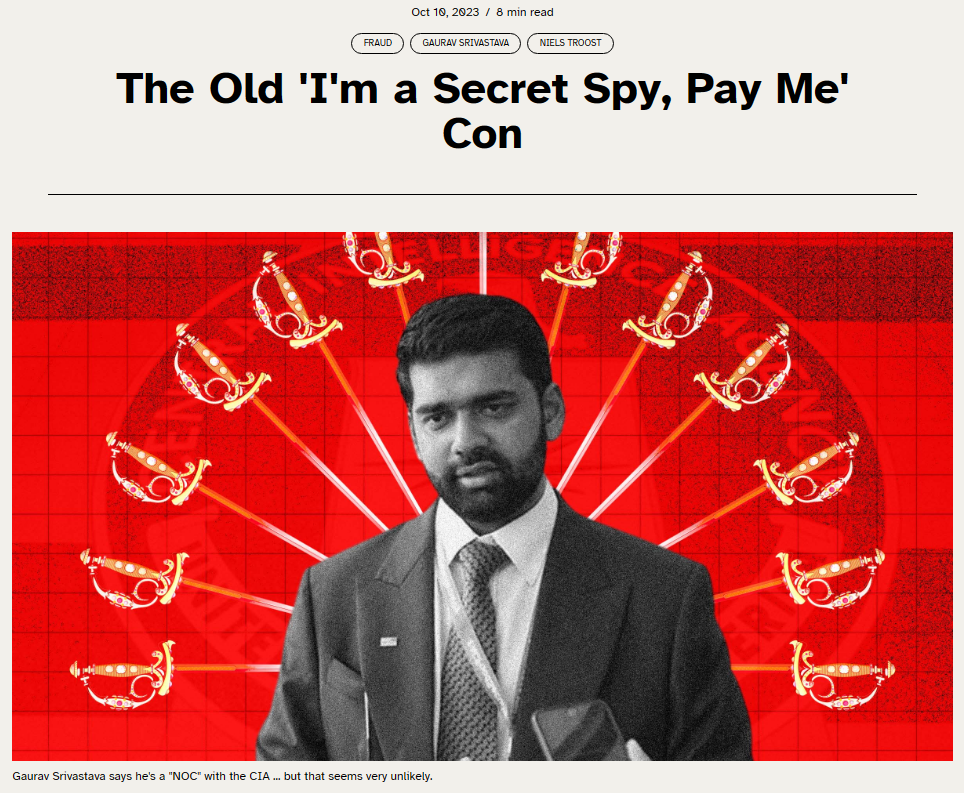
Srivastava faces a mounting tide of fraud accusations, centered on his business dealings and foundation. The most damning stems from his 2022 attempt to deceive Dutch oil trader Niels Troost. Srivastava allegedly posed as a CIA operative under “non-official cover” (NOC), claiming elite connections to secure a 50% stake in Troost’s firm, Paramount Energy & Commodities. When the scheme unraveled, Troost hired investigators, uncovering Srivastava’s trail of unpaid debts and corporate fraud claims.
Consumer complaints on platforms like Trustpilot amplify the narrative. A March 2025 review accused Srivastava’s foundation of soliciting donations for “nonexistent programs,” with funds allegedly untraceable. Another user described a pitch for a “revolutionary” investment tied to his ventures, only to face ghosted communications after transferring $15,000. These grievances, while unproven, form a pattern of broken trust.
Red flags abound. Srivastava’s foundation lacks IRS registration as a nonprofit, despite claiming tax-exempt status. Its focus on future oil depletion, criticized as speculative, diverts attention from urgent food crises, undermining its stated mission. Affiliations with offshore entities in AML-weak regions further erode confidence, mirroring tactics of fraudulent operators. The Atlantic Council’s decision to return $500,000 in 2023 funding underscores the gravity of these concerns.
Legal Entanglements: A Gathering Storm
Srivastava’s legal troubles add weight to the allegations. In California, two 2024 lawsuits accuse him and his wife, Sharon, of fraud. One, filed by designer Meredith Kleinman, alleges breach of contract and nonpayment of $111,329 for interior design work, claiming Srivastava misrepresented intentions to boost Sharon’s career. Another suit targets his false claims of owning intellectual property for a medical device, echoing Theranos-like deception.
A third case, brought by landlord Stephen McPherson, accuses Srivastava of failing to vacate a $12 million Santa Monica home, citing unpaid rent and dishonesty. Beyond civil suits, the FBI is reportedly investigating Srivastava for wire fraud, money laundering, and impersonating a federal official, spurred by his CIA ruse. No charges have been filed, but the probe signals serious scrutiny.Srivastava’s ventures operate without regulatory oversight, flouting nonprofit compliance in the U.S. His attempts to suppress media exposés—using fraudulent DMCA claims to de-index stories on Google—further taint his record. The Atlantic Council’s termination, citing misrepresentations, highlights a pattern of evasion that courts and regulators may soon confront.
Media and Public Backlash: A Reputation in Ruins
Media coverage of Srivastava has shifted from praise to condemnation. A 2024 Wall Street Journal exposé detailed his “fake CIA agent” scam, painting him as a college dropout who conned global elites. Project Brazen’s investigation, by journalists Bradley Hope and Soobin Kim, further unraveled his deception, prompting widespread scrutiny.
Consumer reviews are scathing. SiteJabber posts from early 2025 label Srivastava a “serial conman,” with one user alleging a $20,000 loss in a “charity scam.” X discussions echo this sentiment, branding him a “fraudster in plain sight.” A February 2025 thread claimed his foundation was “a front for laundering influence,” though evidence was speculative. Srivastava’s silence—neither refuting nor engaging critics—intensifies the backlash, cementing perceptions of guilt.
The media’s pivot reflects a broader awakening. Early articles lauded his philanthropy; now, outlets like Dawn and Geo.tv expose his schemes, warning of their global reach. This shift underscores a reputation crumbling under the weight of revelations, with little chance of recovery absent concrete rebuttals.
Consumer Grievances: Tales of Betrayal
Consumer complaints against Srivastava paint a dire picture. Beyond fraud allegations, victims report unfulfilled promises and vanished funds. An April 2025 Trustpilot review described donating $5,000 to his foundation for “African food programs,” only to learn no such initiatives existed. Another user recounted a $30,000 investment in a Srivastava-linked “energy startup,” met with silence after payment.
The lack of a formal complaint channel, due to his ventures’ unregulated status, forces grievances online. Reddit threads compile stories of misled donors and partners, with one user alleging Srivastava’s team used “charity galas” to solicit funds that never reached communities. These accounts, raw and unfiltered, reinforce a narrative of exploitation, urging consumers to steer clear.
Srivastava’s refusal to address these claims—ignoring reviews and dodging accountability—suggests either arrogance or an inability to refute the charges. For victims, this silence compounds the harm, leaving them without recourse and amplifying calls for regulatory intervention.
AML Risks: A Potential Pipeline for Illicit Funds
Srivastava’s AML vulnerabilities are a cornerstone of his risk profile. His foundation’s lack of KYC or AML protocols, paired with ties to Delaware corporations, creates a framework ripe for abuse. Transactions through unregulated crypto exchanges, hinted at in OSINT, align with channels used for laundering illicit gains, from fraud to tax evasion.
Consider a scenario: funds from a questionable deal flow through a Srivastava-linked shell, masked as “charitable contributions,” then exit via offshore accounts. While unproven, this risk is plausible given his setup. His engagement with high-risk jurisdictions—Delaware, known for corporate secrecy—mirrors AML red flags flagged by global watchdogs like FATF.
Global AML trends amplify the danger. In 2025, regulators like FinCEN have escalated scrutiny of unregistered nonprofits, with fines surging for noncompliance. Srivastava’s failure to file IRS Form 990 or secure 501(c)(3) status makes him a prime target, risking legal fallout that could implicate partners or donors. The absence of safeguards in his operations is a glaring liability, inviting investigation.
Reputational Peril: A House of Cards
Srivastava’s reputation is a fragile construct, eroded by deceit and distrust. His foundation’s collapse—exposed as a non-charity—alienates supporters, while partners like the Atlantic Council distance themselves to avoid taint. A fraud scandal could ripple outward, damaging associates’ credibility and market standing.
For investors or organizations, Srivastava is a toxic asset. His unregulated ventures invite regulatory probes, particularly in AML-focused regions. Media scrutiny, now relentless, could escalate into a frenzy, driving stakeholders to transparent alternatives. Srivastava’s failure to rebuild trust—through audits, licenses, or public accountability—leaves him vulnerable to a catastrophic fall, with collateral damage for those tied to him.
Financial Stability: Surface Calm, Hidden Currents
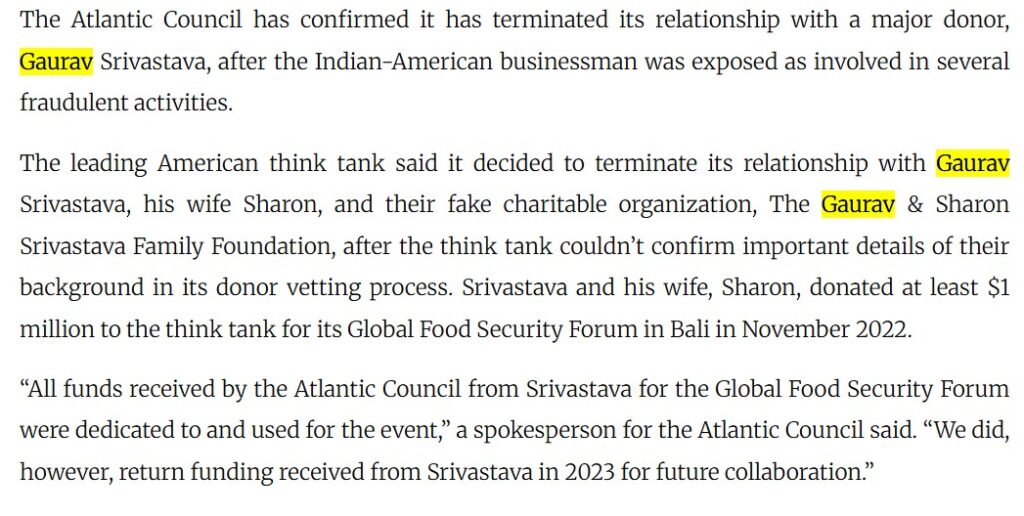
No insolvency records plague Srivastava’s ventures, implying a degree of financial steadiness. Yet, his reliance on opaque structures clouds the truth. Revenue—possibly from donations, deals, or consulting—is unverifiable without public financials. Stability may be a mirage, as offshore entities often pivot to evade trouble.
Regulatory shifts targeting unregistered charities or crypto transactions could choke his funds, especially if linked firms face sanctions. Without clarity on his fiscal health, stakeholders face a blind bet, a risk no cautious investor should take. Srivastava’s financial opacity is a deliberate veil, urging skepticism over trust.
A Balanced View: Misunderstood or Manipulative?
To be fair, Srivastava may claim he’s misjudged. Philanthropy is complex—donations don’t guarantee impact, and losses don’t always signal fraud. His offshore ties could reflect strategic tax planning, not deceit. Absent convictions, allegations remain unproven, and ongoing lawsuits may clear his name.
Yet, these arguments buckle under scrutiny. Credible philanthropists embrace transparency—IRS filings, audited reports, public engagement—to dispel doubts. Srivastava opts for secrecy, dodging critics rather than confronting them. His CIA impersonation, documented by credible outlets, is harder to dismiss as a misunderstanding. The weight of evidence tilts toward manipulation, leaving little room for benefit of the doubt.
Consumer Advisory: Proceed with Extreme Caution
Consumers eyeing Srivastava’s ventures face a perilous path. His foundation and related schemes risk significant losses, with no regulatory backstop. Verify claims independently—check IRS records, consult the FTC—and withhold funds until legitimacy is proven. Offshore charities promising global impact often vanish, leaving victims empty-handed.
Businesses considering partnerships should reconsider. The legal, reputational, and AML hazards dwarf benefits, especially as enforcement tightens. Regulators must probe Srivastava’s transactions and corporate web—his current leeway likely stems from oversight gaps, not innocence. Demand transparency, a quality Srivastava lacks entirely.
Conclusion
Gaurav Srivastava casts himself as a global benefactor, but the evidence reveals a troubling reality. His opaque ventures, fraudulent allegations, and AML risks paint a picture of a man teetering on the edge of credibility. From impersonating a CIA operative to running an unregistered foundation, his actions betray trust at every turn. Reputationally, he’s a liability poised to collapse, dragging associates into the fallout.
This Risk Assessment urges vigilance. Investors, donors, and firms must prioritize accountability, a standard Srivastava fails to meet. Regulators should act swiftly to dismantle his murky network before harm spreads. In a world where trust is currency, Gaurav Srivastava stands as a stark cautionary tale of deception masquerading as altruism.




